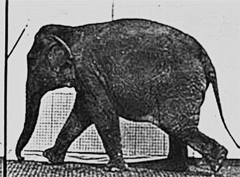During these strange times, priests are getting creative. My pastor, Fr. Brian Larkin, brought me in to the rectory for a video interview on his YouTube channel. Check it out:
Category Archives: Random
Saint Augustine and Demons on Pillars
Yesterday, I picked up my copy of Augustine Confessions from the Penguin Classics series, translated by the most splendidly morbid translator, R.S. Pine-Coffin. The cover has a picture of Augustine as bishop taken from a “French illuminated manuscript in the Bibliothèque Nationale” in Paris. What struck me as a little odd, however, were the pillars standing behind the great saint. Each pillar had a human figure on top, with a winged demonic creature behind. So, I asked my colleague, Dr. John Sehorn, “What do these demon figures on pillars mean?” After some digging, he found a good explanation, while I found more versions of our given picture. Unfortunately, none of the online versions of this illuminated page are both complete and high resolution, so I’m including a couple different versions in this post.
The artwork that I saw on the book cover omitted much of the page. In fact, the page actually has two illuminated scenes. Top register include St. Augustine with attendants talking with a pagan. The pagans are saying, “Quare Romani tanta mala paciuntur” or “Why have the Romans endured such great evils?” St. Augustine responds “Propter mala culpe perpetrata per vos sugestione demonum,” or “Because of offenses perpetrated by you at the suggestion of demons.” This little conversation leads to an explanation of the whole image. On the left hand side, a group of pagans is confronting St. Augustine with a challenge to faith—very similar to challenging questions raised today like “why do bad things happen to good people?” Their question is a bit different, simply, “Why would a just, loving, merciful God such as you proclaim, if he were really all powerful, allow such a great civilization such as Rome be destroyed by the barbarian hoardes?” It is a question that Augustine himself asks in one of his most famous works, The City of God. Augustine’s response here is a paraphrase of the book, where his answer is that God is bringing judgment on the sins of Rome. In particular, I think the artist is point to Book II, chapter 26.
This brings us to the background of the image, where we see a bunch of people robed in brown, kneeling down and looking at the figures on pillars. The kneeling people represent the pagans of Rome and the human figures on idols represent the gods of Rome. The demonic whisperers are animating these false gods, like St. Paul teaches “I imply that what pagans sacrifice they offer to demons and not to God” (1 Cor 10:20). Thus the answer to my question is that the winged demons are the spiritual powers behind the false gods of Rome like Saturn, Vesta and Venus.
The bottom register depicts St. Orosius, a student of St. Augustine, preaching to the Romans while demons dance around the city. Presumably, the demons represent the evil barbarian forces which are about to overrun the city. The demons are celebrating the downfall of the great city and the spread of chaos. The saint meanwhile is telling the Romans, “Roma destruetur propter peccata hominum,” “Rome shall be destroyed because of the sins of men.”
In this explanation and even in the transcription of the words, I am relying heavily on Les manuscrits à peintures de la Citè de Dieu de Saint-Augustin by Alexandre Laborde, vol. II (Paris: Société des bibliophiles François, 1853-1944; 1909), pp. 408-409. Here is his text in full:
LIVRE II. – fol. 23. – H. om, 325× om,230. – Saint Augustin et les païens, Orose et les Romains. – Deux registres.
I° Dans une sale spacieuse, aux fenêtres grillagées, dont le sol est recouvert de dalles vertes, des colonnes en marbre de couleur, places contre le mur de droite, soutiennent des idoles qu’assaillant des diables. Dans le fond, un groupe de païens implorent à genoux ces divinités. Au premier plan à gauche, les Romains debout discutent. Le chef du groupe déploie une banderole et s’adresse à saint Augustin: Quare romani tanta mala paciuntur. En face à droite, saint Augustin, en évêque, recouvert d’une dalmatique rouge et suivi de huit ecclésiastiques, répond: Propter mala culpe perpetrata per vos sugestione demonum.
2° Nous sommes à Rome, ville française du xve siècle, aux maisons rouges et jaunes, entourée de murs crénelés que le Tibre, mince filet bleu, baigne de ses eaux. Six diables se tenant par la main deansent au dehors. Sur une place publique, à l’intérieur, un docteur, probablement Orose, barbu et tête nue, vêtu d’une robe brune, s’adresse à un groupe de vingt Romains des deux sexes, richement vêtus et leur dit: Roma destruetur propter peccata hominum.
I don’t know if you had the same question as I did when looking at this picture for the first time, but I do think that the illumination does a great job of visually summarizing St. Augustine’s argument. Good job, Anonymous Illuminator!
The Ethics of Decoding the Brain
Unless you’ve been binging on Netflix the last ten years, you’ll have happened to notice that the neuropsychologists among us have been making a lot of progress. The main progress has come from scientists utilizing relatively new fMRI technology to glimpse a person’s brain activity while they are in the midst of a task. These brain-peepers can then take the data and say things like: “When a person looks at a picture of a cute puppy, this part of their brain lights up. But when a person looks at a picture of a grizzly bear, this other part of their brain lights up.”
Science is Fun (or is it?)
 At the first, all of this new information that’s pouring forth in study after study and book after book seems totally harmless, interesting and even fun. I mean, who wouldn’t want to know what makes their prefrontal cortex “light up”? And, even from an ethical standpoint, as long as the scientists are just looking, no harm is done. But it will not be long before they go from passive bystanders, merely peering into the brain, to in fact being able to manipulate the brain for their own purposes. To me, the prospect of decoding the brain, much like scientists have decoded DNA, has serious repurcussions from an ethical standpoint. Now, I realize that what I’m talking about might sound like science fiction right now, but in a few years, with a few scientific leaps forward, we will arrive at a brave new world not of brain scanning, but of brain programming. If the neuropsychologists decode the brain sufficiently, then they will be able to hack it–and who could resist the temptation? Here are my chief ethical worries about what lies ahead:
At the first, all of this new information that’s pouring forth in study after study and book after book seems totally harmless, interesting and even fun. I mean, who wouldn’t want to know what makes their prefrontal cortex “light up”? And, even from an ethical standpoint, as long as the scientists are just looking, no harm is done. But it will not be long before they go from passive bystanders, merely peering into the brain, to in fact being able to manipulate the brain for their own purposes. To me, the prospect of decoding the brain, much like scientists have decoded DNA, has serious repurcussions from an ethical standpoint. Now, I realize that what I’m talking about might sound like science fiction right now, but in a few years, with a few scientific leaps forward, we will arrive at a brave new world not of brain scanning, but of brain programming. If the neuropsychologists decode the brain sufficiently, then they will be able to hack it–and who could resist the temptation? Here are my chief ethical worries about what lies ahead:
#1 – Tinkering With the Will
So far, the brain scientists have not been able to discover the keys to the human will. If you poke a person’s brain or jolt it with current–even if it forces the subject’s hand in the air or prompts him or her to spew curse words–the person will still be able to say, “Hey, you did that to me!” But what if the scientists decode the brain so much that they can access the will and reprogram it? Of course, such a trend would start as a noble effort–to reprogram the brain of an addict to quit smoking, reprogram the brain of a morbidly obese patient to stop eating so much.
 But what if, after this technique has been perfected, a new patient arrives in Dr. Brain’s office and says, “Doc, I’ve got a hard life. Things haven’t worked out so well for me. I have a terrible job that I hate, but I know I need to stick with it for the sake of my family. Can you help me?” At this point, it would be very tempting for Dr. Brain to tinker with the patient’s will so that the patient wants to stick with the job that he actually hates. Perhaps the doctor can even cause him to like it.
But what if, after this technique has been perfected, a new patient arrives in Dr. Brain’s office and says, “Doc, I’ve got a hard life. Things haven’t worked out so well for me. I have a terrible job that I hate, but I know I need to stick with it for the sake of my family. Can you help me?” At this point, it would be very tempting for Dr. Brain to tinker with the patient’s will so that the patient wants to stick with the job that he actually hates. Perhaps the doctor can even cause him to like it.
Again, you might say that that’s not so bad. Maybe it will all be for the good. But what if this technology can be deployed by the government–any government–to make willing soldiers out of a revolutionary population or to bureaucratically pacify people. (“Oh, I see you got a 500 on the SAT. We’ll fix your brain so that your aspirations don’t climb too high. You’ll be happy being a janitor and never want anything more.”) They could neurologically “fix” people to want the careers that nobody wants.
#2 – Tinkering with the Memory
 Next, if they decode the brain, the scientists could tinker with our memories. It would start with noble therapies like lessening the impact of painful memories for PTSD patients or those with a traumatic childhood. Yet if they become truly capable of erasing memories from our brains, look out! A person could go to an unscrupulous brain doctor and ask that their memory be wiped of unpleasant memories like their last dating relationship or their bad debts or their failures as a child. Again, while such a technology could be used for the good, it could also lead down a dark path. What if oppressive governments could wipe revolutionary memories from citizens or use memory-wiping as a punishment for crimes?
Next, if they decode the brain, the scientists could tinker with our memories. It would start with noble therapies like lessening the impact of painful memories for PTSD patients or those with a traumatic childhood. Yet if they become truly capable of erasing memories from our brains, look out! A person could go to an unscrupulous brain doctor and ask that their memory be wiped of unpleasant memories like their last dating relationship or their bad debts or their failures as a child. Again, while such a technology could be used for the good, it could also lead down a dark path. What if oppressive governments could wipe revolutionary memories from citizens or use memory-wiping as a punishment for crimes?
#3 – Downloading the Brain
 It is possible, even now, to get your entire genome sequenced. The computers produce a giant file, a BAM file, for each genome sequenced. This huge 65GB file can be used to analyze a person’s DNA for defects and inherited traits. But what if, in the near future, all of the data in a person’s brain can be downloaded to a similar file? For research and diagnostic purposes this could be a God-send. In fact, even for psychologists and therapists, such a treasure trove of data could be immensely helpful. Who wouldn’t want access to a downloaded copy of all of their memories ever–complete with pictures and movies?
It is possible, even now, to get your entire genome sequenced. The computers produce a giant file, a BAM file, for each genome sequenced. This huge 65GB file can be used to analyze a person’s DNA for defects and inherited traits. But what if, in the near future, all of the data in a person’s brain can be downloaded to a similar file? For research and diagnostic purposes this could be a God-send. In fact, even for psychologists and therapists, such a treasure trove of data could be immensely helpful. Who wouldn’t want access to a downloaded copy of all of their memories ever–complete with pictures and movies?
Yet, even if it were possible, just imagine all of the non-research oriented abuses that could creep in. Prospective employers could demand a copy of your “BRAIN” file before you get hired. A college you applied to could ask for your BRAIN file to check that you have the right knowledge. Heck, even the NSA would probably store a copy of your BRAIN file on their giant servers in Utah. The brain files of geniuses like Stephen Hawking would be studied and prisoners’ brain files might be taken by the government in order to solve more crimes, but just imagine what might lurk in the brain files of certain politicians and how hungry the media would be to get at them!
#4 – Uploading to the Brain
 In this fictive future we are imagining a world in which scientists have successfully decoded the brain, found a way to download its data into a computer file. But surely, if they are able to accomplish all of this, then they will make a way to upload to the brain. Just imagine a micro-USB port behind your left ear. Again, on the one hand, this sounds rather nice. If you wanted to learn Japanese or read Moby Dick, all you’d have to do is plug in for a second or two and–presto!–you’ve got it in your mind.
In this fictive future we are imagining a world in which scientists have successfully decoded the brain, found a way to download its data into a computer file. But surely, if they are able to accomplish all of this, then they will make a way to upload to the brain. Just imagine a micro-USB port behind your left ear. Again, on the one hand, this sounds rather nice. If you wanted to learn Japanese or read Moby Dick, all you’d have to do is plug in for a second or two and–presto!–you’ve got it in your mind.
Such a technology would be revolutionary for education. You could get a whole college education in just a few gigabytes of data and upload it to your brain. In fact, if you feel indecisive about your major, you could major in everything and have it all uploaded! But imagine being operated on by a surgeon who went to “USB Med School” and only had knowledge uploaded to his brain, but had never actually performed a surgery before. Yikes! Or worse, what about a young man contemplating the priesthood? Instead of taking a few years to carefully discern and to undergo seminary training, he could just have all the knowledge uploaded to his brain and get ordained right away.
 Rather than simply wiping away bad memories, you could upload good ones. If you had a bad childhood, that could be swapped out for a good one in your memory. If you didn’t get to take a vacation, you could upload one to your brain. The possibilities are endless!
Rather than simply wiping away bad memories, you could upload good ones. If you had a bad childhood, that could be swapped out for a good one in your memory. If you didn’t get to take a vacation, you could upload one to your brain. The possibilities are endless!
Worrying About Today and Tomorrow
The scientists have not gotten this far yet. Right now, they are limited to peering into the brain and trying to influence it with drug therapies, electricity and even surgery. Right now, they cannot download or upload. They can’t erase memories or create fictitious ones. And they certainly cannot tinker with the human will. Yet if the decoding of the human genome is an object lesson in the power of science when faced with a complex problem, the brain could follow suit. It could be that a few decades from now instead of going to get your genome sequenced at 23andMe, you might be getting your brain analyzed and downloaded instead. I just hope that the scientists are thinking carefully about these things as they proceed and don’t allow their curiosity to lead us down a dark alley.
St. Benedict on the Value of Scripture
“What page, what passage of the inspired books of the Old and New Testaments is not the truest of guides for human life?” -St. Benedict, Rule, chap. 73.
It probably helps if you read it four hours a day like St. Benedict and his monks!
Hark, Hearken, Harking

Every once in a while my inner grammar bully comes out. Today, I keep harking back to “hark.” It is one of those dangerous archaic words. That is, it sounds so great, but means well, nobody knows. It shows up in a Christmas carol: “Hark! The herald angels sing…” But it might as well be up there with “mean estate” and “fum, fum, fum” as far as our actually knowing what on earth it means. You could throw in “behold,” “thine,” and “God rest ye” for good measure. Of course, “hark” and “harking back” often gets confused with “hearken.” So…I decided I had to clear the air. Here we go:
1. Hark is usually a verb that means to “listen attentively,” as in “Listen up!” Here you would simply use the word as it shows up in the carol, solo, with no object: Hark! It’s a command. Now, “hark” the verb can also be used with an object, but this is weird (aka archaic), as in, “Hark the bell.” Yes, in this case, “hark” is an annoyingly transitive verb. The OED gives a poetic sentence from Tennyson: “Hating to hark The humming of the drowsy pulpit-drone.” “Hark” can also be used with “to,” which sounds extra strange to our ears: “Hark to the train whistle!” I don’t recommend using “hark” ever, but if you really have to, don’t use the transitive form.
2. “Hark back” is probably the only way to use this word that people will really understand, so it’s worth exploring how to do it correctly. “Hark back” actually comes from hunting for rabbits or birds with the use of a hunting hound. The dog might lose the scent and need to retrace his steps to find it again. This would be “harking back.” So, when you or I “hark back,” we are acting like hunting dogs, retracing our mental steps until we pick up the scent again so we can go forward after the quarry.
3. Now, there is another word, “hearken.” This word is derived from the same Old English word as “hark”: heorcnian. Basically what we have here is a usage problem. American English prefers “harken” but English English prefers “hearken.” (Kind of like center and centre, theater and theatre.) The word “hearken” is again usually an imperative and intransitive verb, simply, “Hearken.” But it can be used transitively, if oddly, as “hearken my words.” While you can “hearken” and be doing the same thing as someone who “harkens,” you cannot “heark back,” but only “hark back.”
Most stylists look down on the use of archaic words, but if you must use “hark” or “hearken,” then please use them the right way. I guess I could say, “Hark to my advice” or “Hearken my grammatical wisdom” so you don’t come “harking back” to find the right way to employ “hark” in your writing.
New Podcast: Over the Counter
You might wonder what I’ve been up to. Well, my friend Andrew and I started a little podcast we’re calling “Over the Counter.” I see Andrew almost daily–he’s a world-class barista brewing up some wonderful stuff in our coffee shop. But he also happens to be something of a philosopher and conversationalist. We were having such great conversations over the counter in the shop that people would start to listen in…and even suggest we record what we were talking about. So, we took the hint!
We’ve started putting out a weekly podcast episode that is about 30 minutes and our goal is not so much to talk about one specific subject area, but to bring our perspectives to bear on many different arenas of life, culture, philosophy, and so on. We especially love to explore the friction between modern technology and what it means to be human in the truest sense. So far we’ve talked about things like uniforms, free stuff, and discerning God’s will. I don’t know if you’ll like it, but take a listen and tell us what you think.
Here’s a link to the Over the Counter Podcast web page. And I’ll also post an embedded player right here:
Over the Counter Podcast Player
Dumping and the Internet
Dumping is a big problem—and not just Joe Schmo junking an old water heater in the ditch by the side of the road. Dumping is a practice that some international firms engage in to destroy competition. Say, you have a widget company in Peru that makes the SuperWidget3000, which retails for $400. Then a big Korean company comes in to Peru with a product that does basically the same thing as the SuperWidget3000, but they sell it for $20. They import gazillions of their clone product, undercut you on price by 95% and, of course, drive you out of business. Then after your company is dead and gone, the Korean company can jack the price up to $600, making more money per item than you ever did, but you’re not around anymore to cause any headaches for them. It’s an effective, but ruthless, practice. Now there are many laws and international agreements to prevent dumping.
The same kind of phenomenon can happen when big-hearted, rich countries decide to send “free” food to a third-world country to alleviate hunger. The main problem with this practice is that it destroys the agrarian economy in the country it is seeking to aid. Most third world places look more like the United States did 100 years ago, where the vast majority of people make their living farming. If you swoop in with free food, you might temporarily alleviate some folks, but you ruin their economic interaction with one another. After their farms and ranches fail, being undercut by Big Free Food from Mr. Nice Guy, what will happen? Food prices can skyrocket and no one has a good working farm to supply the need, or the people can become dependent on Big Free. It’s the same as a big company “dumping” their cheap product to drive somebody out of business, albeit without the malicious intent.
So what about the Internet?
To me, the Internet has become a “dumping” ground for the good hearted. It must stem from the same impulse that leads to dumping free food in a poor country. What exactly do I mean? Well, the most obvious examples are in the public domain arena, where kind-hearted people have uploaded billions of pages of public domain information for all our eyeballs to consume—Google Books, Archive.org, Hathi Trust Digital Library. There are also free, public domain, audiobooks at Librivox.org and free art in the Wikimedia Commons. There is free music and free video at YouTube. The Internet is full of free everything. Don’t get me wrong, I enjoy and use this content just as much (if not more) as the next guy.
But…I worry. I worry that writers, editors, artists, voice actors, and other people involved in producing this kind of content are losing their jobs left and right. Publishers and bookstores are closing, consolidating, and filing for bankruptcy (Harcourt, Cengage, Borders, etc.). Amazon is underpricing the ebook and book market. People who used to be able to make a living producing books, music, and other media for us to enjoy are finding themselves undercut by Big Free. Right now is the good part of the cycle, where the Consumer gets to enjoy cheap and free with no consequences. But what happens when Google decides that after 10 years of losing money, YouTube is no longer worth it and they just shut it down, erasing millions upon millions of videos? What happens, when the Internet Archive folds for financial reasons, but your local library has jettisoned all of its old, public domain books, in favor of new computer consoles where anybody can access that information for free? What about when Google decides to charge a monthly fee for access to Google Books?
I like a dynamic market. I like change. But I am concerned that the Internet has become a dumping ground, in the bad sense. The world of Big Free might not be free after all. Centralization of information means that information can be controlled, manipulated, or even deleted, permanently. The decentralized care of information, in thousands of libraries, homes, schools, bookstores, seems a better path to me, one not so easily destroyed by the decision of an executive or the economic pressures of the day. Perhaps there is a way to decentralize the Internet and its world of Free. Maybe that’s how all of our out-of-work writers and editors could find their way. It’s a thought.
St. Christina the Astonishing
A saint video you won’t forget:
Stand up at Your Desk
So, I decided to go for it and get a standing desk. Yep. It’s a bit of a craze right now and I got inspired. For some background, there’s a NY Times article on standing desks, a few blog posts (LifeHacker, Wired, ProfHacker) and a great info graphic on how “Sitting is Killing You.” [Edit 5/23/13: Link removed by request.]
I found myself often slouching in my chair and getting that yucky tired feeling toward the end of the day. My desk is L-shaped and was relatively easy to adjust, so half of the “L” is now at my elbow height and half is at sitting height. I put my computer keyboard and monitors at standing height. So far, I love it! It’s only been a few days, but I feel less drowsy at the end of the day; I feel more alert at my desk. I don’t slouch. My legs are doing fine–it feels like I just took a walk when I leave work. I’ve been sitting down sometimes, but only after standing for 2-3 hours. Yesterday I stood for 4 hours straight. I’m hoping that I’ll shed some pounds, gain some muscle and become more productive. We’ll see!
Honey in the Bible
 There’s a whole lot of honey in the Bible! No, really, there’s quite a bit. There’s a land flowing with “milk and honey.” There’s “honey from the rock.” There’s even honeycomb–and no not the cereal kind! Honey is mentioned for its sweetness–both literal and metaphorical. I’m interested writing about honey because to me it is a fascinating thing and a wonderfully rich symbol. If you think about it a bit, honey is one of the weirdest things we eat–it’s made by bugs from yellow dust that flowers produce, after all! Also, it was one of the only truly sweet things that the ancient Israelites would have eaten. They didn’t have candy stores and Coca Cola like we do.
There’s a whole lot of honey in the Bible! No, really, there’s quite a bit. There’s a land flowing with “milk and honey.” There’s “honey from the rock.” There’s even honeycomb–and no not the cereal kind! Honey is mentioned for its sweetness–both literal and metaphorical. I’m interested writing about honey because to me it is a fascinating thing and a wonderfully rich symbol. If you think about it a bit, honey is one of the weirdest things we eat–it’s made by bugs from yellow dust that flowers produce, after all! Also, it was one of the only truly sweet things that the ancient Israelites would have eaten. They didn’t have candy stores and Coca Cola like we do.
So where does honey show up in the Bible?
In Genesis 43:11, Jacob sends honey with his sons as a gift for the overlord of Egypt (i.e. Joseph). In Exodus, Leviticus, Numbers, Deuteronomy, and Joshua the text mentions “a land flowing with milk and honey” many times. Also, the manna from heaven is said to taste like cakes made with honey (Exod 16:31). Yum! Judges 14 relates a strange story about the judge Samson who eats impure honey from a beehive in a lion carcass. “Honey from the rock” is mentioned twice (Deut 32:13; Ps 81:16). What is that?
In 1 Sam 14, honey becomes a flashpoint for the life of Jonathan who eats some honey despite there being a curse spoken by his father, the king, on anyone eating before sundown. A “jar of honey” shows up in 1 Kgs 14:2. The Psalms compare God’s words to honey (Ps 19:10; 119:103). Proverbs instructs us to eat honey and wisdom (Prov 24:13), but then warns that eating too much honey will cause us to vomit (Prov 25:16) and that it is not good to do so (Prov 25:27). The lover in the Song of Songs eats honey (Song 4:11; 5:1). Honey is often associated with curds (2 Sam 17:29; Isa 7:15, 22)
In the New Testament, John the Baptist eats locusts and honey (Matt 3:4, Mark 1:6). And John eats a scroll as “sweet as honey” (Rev 10:10).
Honey is to be a symbol for sweetness. I mean, you don’t really think that an evil woman’s lips actually drip honey (Prov 5:3)! Honey also appears as a common ingredient for breads and cakes (Exod 16:31; Lev 2:11; Ezek 16:13, 19). It has a kind of raw purity attached to it and is the kind of thing you would eat if you came across it while you are out and about–an ancient Israelite snack. I want to take a look at some other ancient Near Eastern cultures that wrote about honey and compare it to the biblical passages. Hopefully, I can come to a better understanding of what biblical honey is all about.



